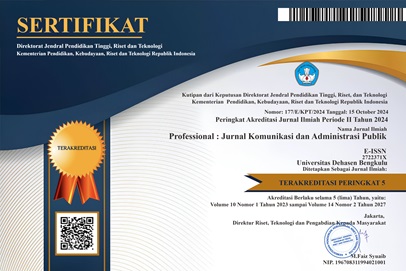Strategi Komunikasi Persuasif Guru Taman Kanak-Kanak “Harapan Bersama” Dalam Karakter Peduli Terhadap Sampah
Abstract
This study aims to determine the persuasive communication strategy of kindergarten teachers "Harapan Bersama" in the character of caring for waste. This study uses the theory of The Meaning Construction Communication Strategy which includes Cognitive Factors and Emotional Factors. And the type of research used is qualitative research. The results of this study indicate that the important role of cognitive and emotional factors in education in the Harapan Bersama Kindergarten environment is that the programs implemented both by teachers at school and parental support at home have had a positive impact in shaping children's understanding and behavior related to caring for waste in their environment. Children's responses suggest that different approaches may be needed to meet individual needs in terms of environmental understanding. This emphasizes the importance of a holistic and diverse approach to environmental education to achieve broader and more integrated outcomes. There were differences in how children responded to environmental issues based on their emotional and cognitive factors, highlighting the complexity of shaping attitudes towards the environment. The results of this study show that persuasive communication strategies through cognitive factors and emotional factors have a positive impact in shaping children's understanding and behavior related to waste care in their environment.
Downloads
Copyright (c) 2024 Nike Susanti, Anis Endang, Sri Narti

This work is licensed under a Creative Commons Attribution-ShareAlike 4.0 International License.





